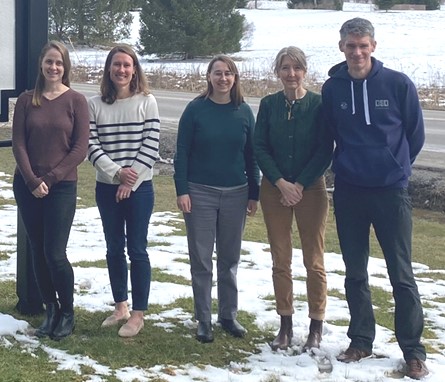“Wicked problems” are problems with many interdependent factors, which make them seem impossible to solve. Improving agricultural safety and health outcomes is a wicked problem. This seemingly impossible challenge is what has propelled us to collaborate with Penn State University and Teagasc, the Irish Agriculture and Food Development Authority, to develop a Policy Think Tank.
Drs. Julie Sorensen of the Northeast Center, Florence Becot of Penn State, and David Meredith of Teagasc were joined by Northeast Center research scientists Drs. Erika Scott and Pam Milkovich in March 2024 to explore the complexities that enervate our agricultural systems, especially focusing on upstream factors that play a downstream role in health and safety.
Blending perspectives from the United States and the European Union, plus backgrounds in a variety of disciplines, this group piqued the interest of the agricultural health and safety research world, especially after a keynote address at the most recent ISASH conference in Portland, Oregon. More recently, an encore was presented on October 2 at the University of Illinois Chicago Environmental and Occupational Health Sciences Community Café.

Highlights from these presentations focused on current research funding largely emphasizing narrow individual-level interventions, as opposed to adopting more broad systematic approaches. Further, the underappreciated structural factors and lived realities need to be fully incorporated and appreciated to ensure interventional success. Moreover, these suggestions are not new realizations – in fact they echo what Kendall Thu noted back in 1998, “There is virtually no research or programs considering the contributions of political, economic, and social factors in farmer health problems, and there is a glaring lack of critical attention to the underlying role of industrial agriculture. Very little has been written to indicate the possibility that these rampant agricultural health problems are symptomatic of a flawed paradigm in food production.”
Do you have something to add to this conversation? If so, feel free to get in touch at info@necenter.org!
“Wicked problems” are problems with many interdependent factors making them seem impossible to solve. Improving agricultural safety and health outcomes is a wicked problem. This seemingly impossibly challenge is what has propelled us to collaborate with Penn State University and Teagasc, the Irish Agriculture and Food Development Authority to develop of a Policy Think Tank.
Drs. Julie Sorensen of the Northeast Center, Florence Becot of Penn State, and David Meredith of Teagasc were joined by Northeast Center research scientists Drs. Erika Scott and Pam Milkovich in March 2024 to explore the complexities that innervate our agricultural systems, especially focusing on upstream factors that play a downstream role in health and safety. Blending perspectives from the United States and the European Union, plus backgrounds in a variety of disciplines, this group piqued the interest of the agricultural health and safety research world, especially after a keynote address at the most recent ISASH conference in Portland, Oregon. More recently, an encore was presented on October 2 at the University of Illinois Chicago Environmental and Occupational Health Sciences Community Café.

Highlights from these presentations focused on current research funding largely emphasizing narrow individual-level interventions, as opposed to adopting more broad systematic approaches. Further, the underappreciated structural factors and lived realities need to be fully incorporated and appreciated to ensure interventional success. Moreover, these suggestions are not new realizations – in fact they echo what Kendall Thu noted back in 1998, “There is virtually no research or programs considering the contributions of political, economic, and social factors in farmer health problems, and there is a glaring lack of critical attention to the underlying role of industrial agriculture. Very little has been written to indicate the possibility that these rampant agricultural health problems are symptomatic of a flawed paradigm in food production.”
Do you have something to add to this conversation? If so, feel free to get in touch at info@necenter.org!


